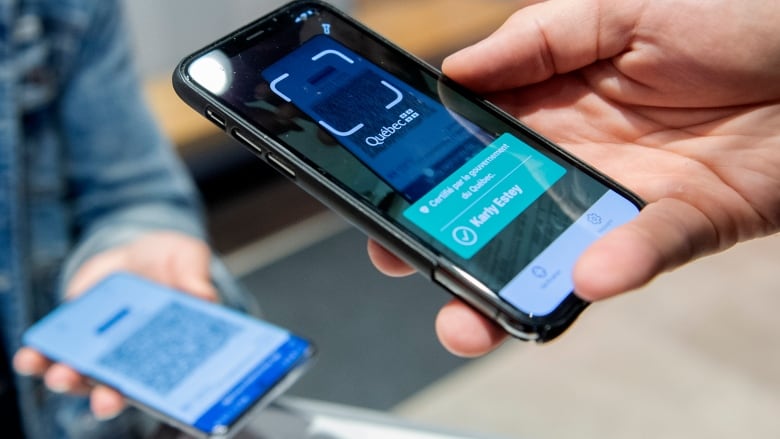Provinces across Canada are introducing vaccine passports, allowing those fully vaccinated against COVID-19 to participate in some indoor recreational activities. But apart from that, what do the passports accomplish, and how effective are they? CBC News spoke to some experts.

This week, Quebec’s government began enforcing its vaccine passport, an electronic record in the form of a quick response (QR) code. B.C. launched its own earlier this month and other provinces plan to soon roll out their own programs.
The passports contain proof that a person has been fully vaccinated against COVID-19, allowing them to participate in some indoor recreational activities. But apart from that, what do they accomplish, and how effective are they? CBC News spoke to some experts.
What should be the main objectives of a vaccine passport?
One of the most important goals is to increase vaccine uptake, experts say.
And that’s particularly important at this stage of Canada’s vaccine campaign, where the number of people getting double dosed has “slowed considerably,” said Dr. Nazeem Muhajarine, professor of community health and epidemiology at the University of Saskatchewan.
“The point is to get us to that herd immunity, a clear majority, 85 to 90 per cent of the population fully vaccinated,” he said. “We are not there yet.”
Another significant objective is to prevent unvaccinated people from entering potential super-spreading environments, said epidemiologist Raywat Deonandan, an associate professor at the University of Ottawa.
“We know this disease explodes when susceptible people are in indoor environments. Who are susceptible? People who are not immune,” he said.

Can passports influence behaviour?
The emerging evidence, though partly observational, suggests the passports can both increase vaccination rates and create safer environments, says Timothy Caulfield, Canada Research Chair in health law and policy at the University of Alberta.
“Most Canadian research increasingly tells us this,” Caulfield said, though he acknowledges researchers don’t have as much empirical evidence as they would like.
When French President Emmanuel Macron announced his country’s vaccine passport policy, more than a million people signed up to receive a shot, according to government figures.
The same phenomenon occurred in some Canadian provinces. Ontario Ministry of Health officials say appointments doubled following the government’s recent passport announcement. Quebec reported similar results.
“So right away, we know it works to encourage and incentivize people who are on the fence,” Deonandan said.

B.C. officials said following its passport announcement, the number of people registering for the vaccination program or booking appointments each day has jumped by as much as 201 per cent compared to a week earlier,
But B.C. epidemiologist Caroline Colijn says, while there was a dramatic upturn in vaccinations, a significant segment of the province’s population is still not vaccinated.
“It changed things noticeably, but it wasn’t like, ‘Wow, OK, we’ll get that extra 10 per cent or 20 per cent in the next three weeks,'” she said. “It’s not that rapid.”
What makes them effective?
Deonandan says using a QR code for the passports is critical because they’re highly secure and manageable. The codes are indecipherable to the naked eye, and must be read by an equally secure device.
“If you think about it, if you go into a bar and you are showing a bouncer your ID, you’re showing where you live, your name and your age. Whereas a vaccine passport QR code comes up and says your name and are you vaccinated. Yes or no. Done,” he said.
“And that’s managed from a central database of the Ministry of Health that’s pretty secure.”
Muhajarine listed three features a vaccine passport needs to be most effective. Most importantly, they can’t be falsifiable.
“They have to be very secure. We don’t want to create a market for people to make a quick buck,” he said.
Secondly, the passport needs to be easy to display, something “you can actually have on you on your phone, some kind of handheld device, or on your wallet, so the QR code works very well,” he said.
And lastly, they need to be interoperable; a passport issued in Ontario should be readable by devices in Toronto and Ottawa as in Prince George or Saskatchewan.
Such systems need to be co-ordinated and talking to each other, he says.
“Nobody should be carrying multiple versions of a document for vaccine, right? Should be just one.”

